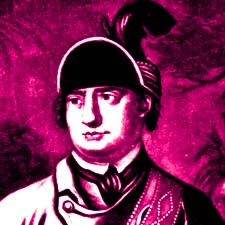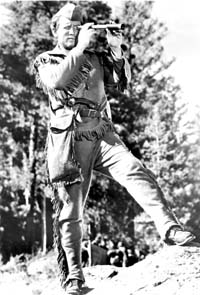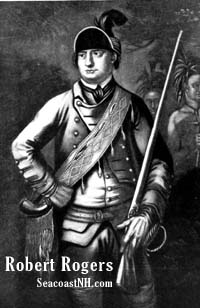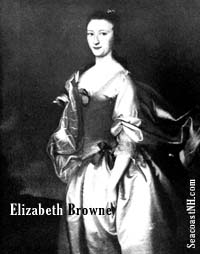|
FRESH STUFF DAILY |
|
|
||
|
|
||
|
|
||
|
SEE ALL SIGNED BOOKS by J. Dennis Robinson click here |
||
He is a troubling hero. Praised as America's first great national hero, Robert Rogers formed a crack militia to ward off Indian attacks. But he also fought against American patriots in the Revolution. Ouch! Love or hate him, Rogers has close connections to Portsmouth, NH. His wife hails from here. And a famous film about Rogers Rangers opens in Seacoast, New Hampshire.
The opening scene of the 1940 film Northwest Passage is Portsmouth's peak cinematic moment. The story begins in 1759. Carriages clatter down unpaved roads past colonial mansions while seamen haul gigantic ropes and load tall ships along Ceres Street. The entire city, including Stoodley's Tavern, came briefly alive inside a Hollywood studio.
Filmed just before America entered World War II, Northwest Passage is a thinly disguised recruitment poster. Drafted into Rogers’ elite force, often compared to the modern Green Berets, Langdon and Hunk overcome impossible odds, defeat the French, and return safely home, Imbued with patriotism. Stopping back in Portsmouth in the final scene of the film, Rogers bravely returns to the battlefront, a symbol of the indomitable American spirit. But no one here talks much about Robert Rogers anymore. Famous Indian killers who carried around Native American scalps are distinctly out of fashion. With our fading grasp of history, many Americans find it confusing that Rogers Rangers actually worked for, not against, the British military. Despite his sometimes heroic efforts at Ticonderoga, Crown Point, Quebec, Detroit and elsewhere, Rogers independent streak led to his arrest for treason against the British, his court martial and later acquittal. When the Revolution arrived in 1775, he applied for a commission. Rejected by George Washington as "the only man I was ever afraid of", Robert Rogers was instead arrested as a spy. In revenge, he escaped and turned Loyalist, commanded the Queen's Rangers, and fought against the American cause. So New Hampshire has been reluctant to claim Rogers, who was technically born in Methuen, Massachusetts. He moved with his family to a 2,190-acre wilderness farm near what is now Dunbarton. His father, according to legend, was shot by a neighbor who mistook him for a bear. Rogers did not invent the ranger concept. Colonists had formally used Indian tactics to repel Indian attacks as early as the mid-1670s. Rogers, instead, codified the "Ranging Rules" and successfully recruited and trained companies of frontiersmen who defended British-held portions of North America in the Hudson River area. Unlike the formal "redcoats", rangers wore green leather uniforms, employed guerilla tactics and were empowered to act independently in battle.
Despite heavy losses, scandal and frequent failure, Rogers Rangers are credited with turning the tide in what Europeans called The Seven Years War. Although Rogers fought for the British, most of his Rangers became patriots. John Stark of Manchester, Rogers' trusted lieutenant, became a key general in the Revolution. Ebenezer Webster of East Kingston, future father of statesman Daniel Webster, is among the Rangers portrayed in the book version of Northwest Passage by Kenneth Roberts. Roberts' well-researched novel, published in 1936, was largely responsible for reviving the Rogers legend. Among the people credited with assisting the author was Portsmouth librarian Dorothy Vaughan who lived to age 99. At the end of Northwest Passage, hero Langdon Towne marries his Portsmouth sweetheart. In reality, it was Robert Rogers himself who married a Portsmouth woman. On June 30, 1761, Rogers married Elizabeth Browne, the youngest daughter of the influential minister of Queen's Chapel, now St. John's Church. Rev. Arthur Browne, leader of the local Anglican Church, was among the city's most powerful men prior to the Revolution. Browne, who had married British Royal Governor Benning Wentworth to his young housekeeper, officiated at his daughter's wedding too. She was 20. Rogers was 29. Their separation during his court martial trial is the subject of a ballad by John Greenleaf Whittier appropriately titled "The Ranger". Rockingham County records show Rogers at this time listing himself as "of Portsmouth". At least two dozen accounts show him speculating heavily in land, including one parcel of 3,000 acres presented by Gov. Benning Wentworth. The couple soon moved to Concord, NH (then Rumford) where Elizabeth lived with her enslaved servants Sylvia, Castro, Pomp and an Indian boy Billy, "who had been captured in the St. Francis raid". Here Rogers wrote his memoirs and even authored a play. Curiously, Rogers transferred ownership of the Concord house, lands and slaves to Elizabeth's father. She later inherited them.
Two odd and interwoven footnotes round out Robert Roger's Piscataqua connection. In 1777 the frigate Ranger, originally a privateer named "The Portsmouth" left Portsmouth Harbor en route to its famous raid against England. The ship's figurehead depicted a colonial ranger holding his rifle. The following year, in 1778, Elizabeth petitioned the New Hampshire General Assembly for a divorce from her husband on the grounds of Desertion and infidelity. Ironically, Elizabeth then married Captain John Roche the man who had originally been chosen to command The Ranger. Roche, also rumored to be a heavy drinker and a man of untrustworthy character, was replaced aboard Ranger by an ambitious young mariner named John Paul Jones. Jones sailed Ranger into history even as Robert Rogers was commanding the Queen’s Rangers against his own homeland. Copyright © 2005 by J. Dennis Robinson. All rights reserved. Early portraits from Reflections of a Social Capital. Please visit these SeacoastNH.com ad partners.
News about Portsmouth from Fosters.com |
| Friday, April 19, 2024 |


|
Copyright ® 1996-2020 SeacoastNH.com. All rights reserved. Privacy Statement
Site maintained by ad-cetera graphics

 HISTORY
HISTORY




 But the bustling pre-Revolutionary seaport was just a plot device. The movie is really about the French and Indian War and the exploits of Roger's Rangers, a well-trained guerilla fighting group. The Portsmouth scenes merely introduce two key characters -- Langdon Towne (played by Robert Young of television’s Father Knows Best) and Hunk Mariner (played by Walter Brennan of The Real McCoys). The fictional Portsmouth natives quickly head west to the New York territory and join the Rangers, run by a nonfiction New Hampshire man named Robert Rogers (played by Spencer Tracy).
But the bustling pre-Revolutionary seaport was just a plot device. The movie is really about the French and Indian War and the exploits of Roger's Rangers, a well-trained guerilla fighting group. The Portsmouth scenes merely introduce two key characters -- Langdon Towne (played by Robert Young of television’s Father Knows Best) and Hunk Mariner (played by Walter Brennan of The Real McCoys). The fictional Portsmouth natives quickly head west to the New York territory and join the Rangers, run by a nonfiction New Hampshire man named Robert Rogers (played by Spencer Tracy). Rangers carried "a firelock, sixty rounds of powder and ball, and a hatchet" and stood to inspection daily. They practiced their marksmanship, which the British saw as a waste of ammunition. They were experts at capturing enemy scouts and extracting information by any means necessary. Rangers marched in single file to keep one shot from killing two men. They were advised not to fire in battle until the enemy was very close, and were invited to disperse and run away if the odds were against them. A set of 28 rules told rangers how to travel in marsh, woods and along rivers, how to scout, to eat, to camp and to attack. Rangers carried their own food separately and could travel by canoe, afoot, on snowshoes and even ice skates. British forces, bound by a wholly different European code of battle, considered the unconventional rangers primitive, but valuable against the elusive French and Indian forces. Rogers, who had a "magnetic personality", was made a major and hired by the British to develop nine companies of men, used largely as scouts. A student of Indian warfare, he created one company made up entirely of Native Americans. His mission, ultimately, was to obliterate the Abenaki-speaking tribes that had killed hundreds of British pioneers. Today re-enactors from Michigan to Oregon to Kentucky and New York still dress in green garb and relive the ranger lifestyle.
Rangers carried "a firelock, sixty rounds of powder and ball, and a hatchet" and stood to inspection daily. They practiced their marksmanship, which the British saw as a waste of ammunition. They were experts at capturing enemy scouts and extracting information by any means necessary. Rangers marched in single file to keep one shot from killing two men. They were advised not to fire in battle until the enemy was very close, and were invited to disperse and run away if the odds were against them. A set of 28 rules told rangers how to travel in marsh, woods and along rivers, how to scout, to eat, to camp and to attack. Rangers carried their own food separately and could travel by canoe, afoot, on snowshoes and even ice skates. British forces, bound by a wholly different European code of battle, considered the unconventional rangers primitive, but valuable against the elusive French and Indian forces. Rogers, who had a "magnetic personality", was made a major and hired by the British to develop nine companies of men, used largely as scouts. A student of Indian warfare, he created one company made up entirely of Native Americans. His mission, ultimately, was to obliterate the Abenaki-speaking tribes that had killed hundreds of British pioneers. Today re-enactors from Michigan to Oregon to Kentucky and New York still dress in green garb and relive the ranger lifestyle. The New Hampshire Gazette reported news of the marriage. When the Rogers moved west 1,300 miles to command a British outpost, the Gazette noted the story. And when Rogers was arrested and taken away in irons for treason, the Gazette suggested that he was most likely innocent of the charges. But despite John Stark's protest that Rogers had been unfairly branded as a Tory, public sentiment, even in Portsmouth, eventually turned against him. Though he claimed to love his native country, Rogers never returned. Living in England after the Revolution, Rogers drank heavily and died in obscurity in 1795.
The New Hampshire Gazette reported news of the marriage. When the Rogers moved west 1,300 miles to command a British outpost, the Gazette noted the story. And when Rogers was arrested and taken away in irons for treason, the Gazette suggested that he was most likely innocent of the charges. But despite John Stark's protest that Rogers had been unfairly branded as a Tory, public sentiment, even in Portsmouth, eventually turned against him. Though he claimed to love his native country, Rogers never returned. Living in England after the Revolution, Rogers drank heavily and died in obscurity in 1795.














